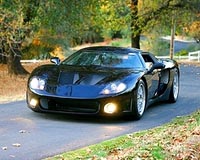 |
Washington (AFP) Dec 2, 2009 American drivers fond of their gas guzzlers will have to quickly learn to love greener cars, which are expected to get a big boost from upcoming international climate talks in Copenhagen. The aim of the December 7-18 global conference is reducing environmentally-damaging greenhouse gases, and key to that goal, industry officials said, is reducing emissions from carbon-belching automobiles. "It's very well understood by the automobile companies, energy companies, petroleum companies, that the automobile must change and the fuel for the automobile must change," said University of California, Irvine professor Scott Samuelsen. "The manufacturers of vehicles and the fuel providers have been working since the late 1980s for that transition, and we're now at the threshold of making that transition," said Samuelsen, director of the National Fuel Cell Research Center. "I believe that the public will become much more aware during the next year of the fact that their life will be very different in the future with respect to the automobile than it is today." While there has been some modest success in creating environmentally-friendly cars in the United States, production is expected to ramp up markedly following next week's UN sponsored climate talks to clinch a successor treaty to the Kyoto Protocol before it expires in 2012. Different automotive experts have floated different ways of achieving that goal, however. Felix Kramer of CalCars, a leading promoter of green technology in the auto industry, staunchly backs plug-in hybrids, for which he is a pioneer and outspoken advocate. "For the near term, I think that Americans are glued to their cars," said Kramer. Plug-ins soon to be on the market include the Chevrolet Volt to be launched in November 2010 as a 2011 model. For the first 40 miles (65 kilometers), Volts will be powered by electricity stored in rechargeable lithium-ion batteries. Toyota will soon make available its plug-in hybrid Prius, while fellow Japanese automaker Nissan has announced the LEAF, another lithium-ion battery powered vehicle, but one designed to have a longer range of 100 miles. Kramer noted that Americans will be weaned from their cars with difficulty, but might be persuaded to adopt technology that allows use of both the gasoline engine and a battery pack for the hybrid system. "I think that they're the platform for future developments of vehicles," Kramer said. "The trend will be to increasing electrification. For many people, that will be the vehicle they will use if it's a single car household," he said. The goal of the Copenhagen conference is to hammer out a deal on curbing greenhouse gas emissions. The results of those talks are likely to have global reach, including on the beleaguered US auto industry. US President Barack Obama is scheduled to address the Copenhagen meeting on December 9 and is expected to offer to curb US emissions by 17 percent from 2005 levels by 2020. His offer is less than calls by the European Union, Japan and UN scientists but nevertheless puts on the table the first concrete numbers from the world's largest economy and second biggest polluter. The announced targets to curb greenhouse gas emissions mirror those outlined in a bill passed by the House of Representatives in June. The goals -- with longer-term pledges of a 30 percent reduction in emissions by 2025, 42 percent by 2030 and 83 percent by 2050 -- are conditional on action in Congress. A slightly more ambitious measure before the Senate, but not due to be debated again until early next year, proposes a 20 percent reduction from 2005 levels by 2020. Already consumers are showing a readiness to embrace the hybrid. Hybrid sales are estimated to grow to 4.1 percent of the total US auto market this year, or about 329,000 vehicles, up from 2.6 percent in 2008, according to tracking firm IHS Global Insight of Lexington, Massachusetts. "There's no option that has been put forward for the future of the automobile than electricity and hydrogen," Samuelsen said. With respect to hydrogen cars -- the other environmentally-friendly alternative to gasoline -- he said those cars are not marketable yet, but well on the way to getting there, and could be "competitive" within five years' time. "I'm both optimistic and confident that the price will be very competitive in 2015 to the gasoline vehicles. The price point is around 40,000 to 50,000 dollars," he said. Share This Article With Planet Earth
Related Links Car Technology at SpaceMart.com
 Hybrid-Electric Supercar With Microturbine Technology To Debut At LA Auto Show
Hybrid-Electric Supercar With Microturbine Technology To Debut At LA Auto ShowChatsworth CA (SPX) Dec 03, 2009 Capstone Turbine is pushing traditional hybrid-electric vehicle barriers with the introduction of the CMT-380, a high-performance, hybrid-electric supercar powered by traditional batteries and an untraditional, ultra-low emission, range-extending microturbine. The Capstone microturbine is essentially an ultra-clean and quiet jet engine under the hood. The prototype hybrid-electric supercar ... read more |
|
| The content herein, unless otherwise known to be public domain, are Copyright 1995-2009 - SpaceDaily. AFP and UPI Wire Stories are copyright Agence France-Presse and United Press International. ESA Portal Reports are copyright European Space Agency. All NASA sourced material is public domain. Additional copyrights may apply in whole or part to other bona fide parties. Advertising does not imply endorsement,agreement or approval of any opinions, statements or information provided by SpaceDaily on any Web page published or hosted by SpaceDaily. Privacy Statement |